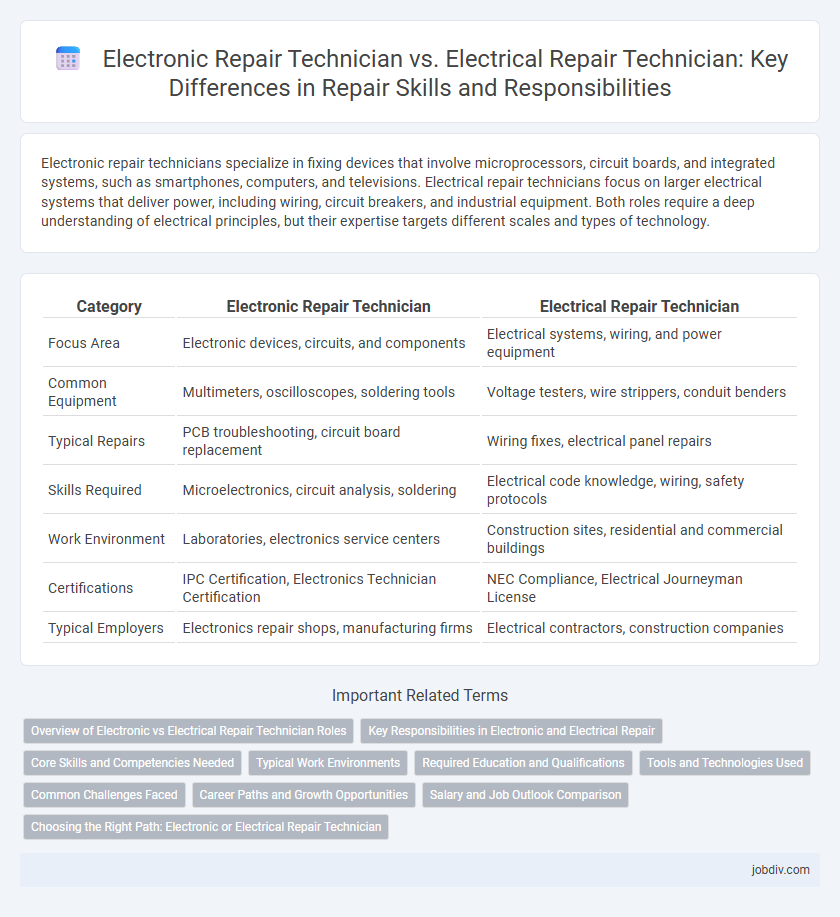Electronic repair technicians specialize in fixing devices that involve microprocessors, circuit boards, and integrated systems, such as smartphones, computers, and televisions. Electrical repair technicians focus on larger electrical systems that deliver power, including wiring, circuit breakers, and industrial equipment. Both roles require a deep understanding of electrical principles, but their expertise targets different scales and types of technology.
Table of Comparison
| Category | Electronic Repair Technician | Electrical Repair Technician |
|---|---|---|
| Focus Area | Electronic devices, circuits, and components | Electrical systems, wiring, and power equipment |
| Common Equipment | Multimeters, oscilloscopes, soldering tools | Voltage testers, wire strippers, conduit benders |
| Typical Repairs | PCB troubleshooting, circuit board replacement | Wiring fixes, electrical panel repairs |
| Skills Required | Microelectronics, circuit analysis, soldering | Electrical code knowledge, wiring, safety protocols |
| Work Environment | Laboratories, electronics service centers | Construction sites, residential and commercial buildings |
| Certifications | IPC Certification, Electronics Technician Certification | NEC Compliance, Electrical Journeyman License |
| Typical Employers | Electronics repair shops, manufacturing firms | Electrical contractors, construction companies |
Overview of Electronic vs Electrical Repair Technician Roles
Electronic repair technicians specialize in diagnosing and fixing complex electronic devices such as computers, smartphones, and circuit boards, utilizing skills in microelectronics and signal processing. Electrical repair technicians focus on maintaining and repairing electrical systems, wiring, and heavy machinery in residential, commercial, or industrial settings, often working with power distribution and electrical codes. Both roles require problem-solving abilities and technical knowledge, but electronic technicians deal primarily with low-voltage, delicate components, while electrical technicians handle high-voltage systems and infrastructure.
Key Responsibilities in Electronic and Electrical Repair
Electronic Repair Technicians specialize in diagnosing and fixing circuit boards, microprocessors, and semiconductor devices in gadgets like smartphones, computers, and audio equipment. Electrical Repair Technicians focus on maintaining and repairing electrical systems, including wiring, circuit breakers, transformers, and motors in residential, commercial, or industrial settings. Both roles require expertise in troubleshooting, testing with specialized tools, and ensuring compliance with safety standards, but electronic repair emphasizes delicate electronic components while electrical repair involves higher voltage power systems.
Core Skills and Competencies Needed
Electronic repair technicians require expertise in circuit board diagnostics, soldering precision, and microprocessor troubleshooting, emphasizing knowledge of semiconductors and digital systems. Electrical repair technicians focus on competencies in wiring, electrical code compliance, and high-voltage system maintenance, specializing in power distribution and industrial machinery. Both professions demand strong problem-solving skills, safety awareness, and the ability to read technical schematics accurately.
Typical Work Environments
Electronic Repair Technicians typically work in specialized repair shops, electronics manufacturing plants, or service centers dealing with consumer electronics, computers, and communication devices. Electrical Repair Technicians often operate in industrial, commercial, or residential settings, focusing on wiring, electrical systems, and machinery maintenance. Both roles may involve fieldwork, but Electronic Technicians are more likely to work on circuit boards and small devices, while Electrical Technicians handle larger electrical infrastructure.
Required Education and Qualifications
An Electronic Repair Technician typically requires formal education such as an associate degree or certification in electronics technology, focusing on circuit boards, microchips, and telecommunications. In contrast, an Electrical Repair Technician often needs a high school diploma combined with vocational training or an apprenticeship, emphasizing wiring, transformers, and electrical systems in buildings. Both roles demand strong troubleshooting skills, but certification like the Electronics Technicians Association (ETA) credential benefits electronic technicians, while electricians often pursue licenses relevant to local electrical codes.
Tools and Technologies Used
Electronic repair technicians primarily use soldering irons, oscilloscopes, multimeters, and logic analyzers to diagnose and fix circuit boards, microprocessors, and digital components. Electrical repair technicians rely on voltage testers, insulation resistance testers, clamp meters, and wire strippers to maintain and repair wiring systems, transformers, and electrical panels. Both professions leverage diagnostic software and handheld devices, but their tools reflect specialization in either low-voltage electronic circuitry or high-voltage electrical infrastructure.
Common Challenges Faced
Electronic repair technicians and electrical repair technicians both encounter challenges related to diagnosing complex system failures, often requiring advanced troubleshooting skills and precision tools. They frequently face issues such as component-level defects, circuit malfunctions, and software-related problems in embedded systems, which demand a comprehensive understanding of both hardware and firmware. Navigating outdated equipment and rapidly evolving technology standards further complicates repairs, necessitating continuous education and adaptability within their respective fields.
Career Paths and Growth Opportunities
Electronic repair technicians specialize in diagnosing and fixing circuit boards, microchips, and digital devices, opening career paths in consumer electronics, telecommunications, and computer hardware industries. Electrical repair technicians focus on electrical systems, wiring, and power distribution, with growth opportunities in construction, industrial maintenance, and utility sectors. Advancing in either field may involve certifications such as CompTIA A+ for electronics or NEC certification for electrical systems, enhancing job prospects and salary potential.
Salary and Job Outlook Comparison
Electronic repair technicians typically earn an average salary ranging from $40,000 to $60,000 annually, with job growth projected at 5% through 2030 due to increasing reliance on consumer electronics and digital devices. Electrical repair technicians often command slightly higher wages, averaging $45,000 to $65,000 per year, supported by a stronger job outlook of 7% growth driven by expanding infrastructure and renewable energy projects. Both careers offer steady demand, but electrical repair technicians benefit from broader industry applications and higher salary potentials in specialized sectors.
Choosing the Right Path: Electronic or Electrical Repair Technician
Choosing between an Electronic Repair Technician and an Electrical Repair Technician depends on specialization and career goals. Electronic Repair Technicians focus on diagnosing and fixing circuitry within devices like computers, smartphones, and audio equipment, requiring skills in microelectronics and digital systems. Electrical Repair Technicians work with high-voltage systems, wiring, and mechanical components in buildings or industrial settings, emphasizing knowledge in electrical power distribution and maintenance.
Electronic Repair Technician vs Electrical Repair Technician Infographic

 jobdiv.com
jobdiv.com